For Sunday January 3, 2021
Lectionary Readings (Revised Common Lectionary, Year B)
Jeremiah 31:7–14 or Sirach 24:1–2
Psalm 147:12–20 or Wisdom 10:15–21
Ephesians 1:3–14
John 1:1–18
NOTE: Debie Thomas is taking her annual two-week break, and will return with her lectionary essay on January 3. Daniel B. Clendenin founded Journey with Jesus in 2004. To learn more about Dan, click here.
Back in 2008 when we painted our house, I called the Friends of the Library to help me purge my bookshelves. They hauled away thirty-two cartons—1,002 books, if I counted correctly. Then, one year ago next month, when we moved to San Diego after twenty-five years in Palo Alto, I purged my remaining books a second time.
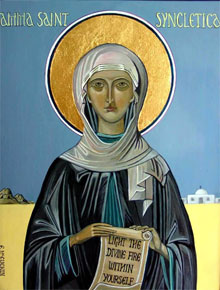 |
|
Mother Syncletica (4th century).
|
I'm now down to a total of about fifty books. What interests me is not the books that I gave away, but the few that I kept. I kept my well worn copy of my favorite novel (Infinite Jest). Then, in addition to some reference books, Bibles, and eight books of poetry, I kept fourteen volumes on the desert monastics of the fourth century. That's it.
About twenty years ago I spent a considerable time reading these early mothers and fathers who fled the corruption of church and society to seek Christ in the solitude of the Egyptian desert. Especially formative for me was the four-volume Philokalia, considered by Eastern Orthodox believers to be second in importance only to the Bible. I also enjoyed several contemporary overviews of these eccentric saints: Where God Happens (2005) by former Archbishop of Canterbury Rowan Williams, and then In the Heart of the Desert: The Spirituality of the Desert Fathers and Mothers (2003) by John Chryssavgis, Professor of Theology and former Dean at Holy Cross Greek Orthodox School of Theology.
Today the desert monastics strike us as anachronistic oddballs, and certainly no one would accuse them of being well-adjusted to church or society. But we misunderstand them if we construe their bizarre lifestyles as a spirituality of superficial techniques. These desert dwellers were practitioners of healing, not abstract theoreticians. They sought personal transformation, not theological information.
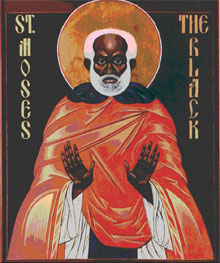 |
|
Saint Moses of Ethiopia (4th century).
|
For them the desert was a specific place, redolent with antecedents in the Bible — the children of Israel and Moses in the desert, the baby Jesus's flight to Egypt, and then our first glimpse of him as an adult when the Holy Spirit drove him into the desert to be tempted by Satan.
But the desert was more than a harsh environment for ascetic practices. What really motivated them was a transformation of the interior geography of the human heart. And so Chryssavgis introduces his book and summarizes the entire message of the monastics with an aphorism from W.H. Auden's In Memory of W.B. Yeats: "In the deserts of the heart, let the healing fountain start."
I love the desert monastics most of all for their profound humility, humanity, and, believe it or not, their wry sense of humor. These saints modeled a spirituality of imperfection in which one is not ashamed or embarrassed to embrace one's brokenness, wounds, darkness, and inner demons. They comfortably acknowledged that lifelong struggle is a necessary virtue.
As we think about New Year resolutions this week, here are a dozen nuggets of wisdom that I've gleaned from the "sayings" (Greek, Apophthegmata) of the desert monastics. I'll resist commenting upon them; you can personalize them for your own journey.
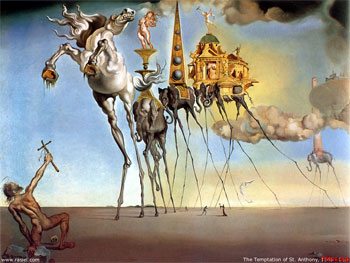 |
|
Salvador Dali, The Temptation of Saint Anthony (1946), the father of Christian monasticism.
|
Never stop starting over: "Abba Poeman said regarding Abba Prin that every day he made a new beginning." "My God, do not abandon me. I have done nothing good before Thee, but grant me, in Thy compassion, the power to make a start" (Arsenios, 5th century).
Live intentionally, not aimlessly: "Think nothing and do nothing without a purpose directed to God. For to journey without direction is wasted effort" (St. Mark the Ascetic, 5th century).
Never, ever despair, no matter what: "Let us eagerly draw near to Christ, and let us not despair of our salvation. For it is a trick of the devil to lead us to despair by reminding us of our past sins" (St. Makarios of Egypt, 5th century). "When someone is defeated after offering stiff resistance, he should not give up in despair. Let him take heart, encouraged by the words… God raises up all who are bowed down (Psalm 145:14). Do all in your power not to fall, for the strong athlete should not fall. But if you do fall, get up again at once and continue the contest. Even if you fall a thousand times… rise up again each time." (St. John of Karpathos, date unknown).
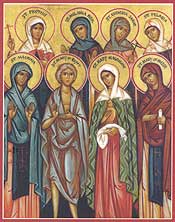 |
|
Eight Desert Mothers.
|
Pray simply, not stupidly: "Often when I have prayed I have asked for what I thought was good, and persisted in my petition, stupidly importuning the will of God, and not leaving it to Him to arrange things as He knows is best for me. But when I have obtained what I asked for, I have been very sorry that I did not ask for the will of God to be done; because the thing turned out not to be as I had thought" (Evagrios the Solitary, 4th century). Abba Macarius said, "It is enough to say, 'Lord, as you will, and as you know, have mercy.' And if the conflict grows fiercer, say: 'Lord, help!'
Renounce all self-justification: According to John the Dwarf, "We have put aside the easy burden, which is self-accusation, and weighed ourselves down with the heavy one, self-justification."
Stop judging others: "The monk, says Moses, must never judge his neighbor at all in any way whatever." "They said of Abba Macarius that just as God protects the world, so Abba Macarius would cover the faults he saw, as though he did not see them, and those he heard, as though he did not hear them."
Stay put: Mother Syncletica (4th century), "If you find yourself in a monastery do not go to another place, for that will harm you a great deal. Just as the bird who abandons the eggs she was sitting on prevents them from hatching, so the monk or the nun grows cold and their faith dies when they go from one place to another." "In Scetis a brother went to Moses to ask for advice. He said to him, 'Go and sit in your cell, and your cell will teach you everything.'"
Celebrate theological modesty: "St. John Chrysostom says that we do not know wholly even what is given in part, but know only a part of a part" (St. Peter of Damaskos, 12th century).
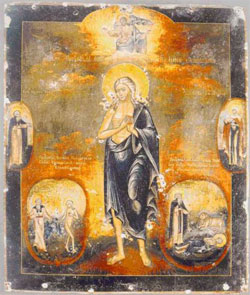 |
|
St. Mary of Egypt (4th century).
|
Acknowledge my brokenness: "The person who has come to know the weakness of human nature has gained experience of divine power. Such a person never belittles anyone. . . . He knows that God is like a good and loving physician who heals with individual treatment each of those who are trying to make progress" (St. Maximos the Confessor, 7th century). "A brother said to Abba Theodore, 'Speak a word to me for I am perishing.' Sorrowfully, the old man said: 'I myself am in danger. So what can I say to you?'"
Be ruthlessly realistic: "Saint Anthony said to Poemen, 'expect trials and temptations until your last breath.'" "I am convinced that not even the apostles, although filled with the Holy Spirit, were therefore completely free from anxiety. . . . Contrary to the stupid view expressed by some, the advent of grace does not mean the immediate deliverance from anxiety" (St. Makarios of Egypt, 5th century).
Always think good of everyone: "Show the greatest gentleness toward all people" (Evagrios the Solitary, 4th century).
Read the obituaries: "When the death of Arsenius drew near, the brothers saw him weeping and asked, 'Truly, Father, are you afraid?' 'Indeed,' he answered them, 'the fear which is mine this hour has been with me ever since I became a monk.'" "At the moment of our death we will all know for certain what is the outcome of our life" (St. Gregory of Sinai, 13th century).
Dan Clendenin: dan@journeywithjesus.net
Image credits: (1) St. Mary Magdalen Orthodox Church, New York City; (2) The Christian Coptic Orthodox Church Of Egypt; (3) www.fotos.org; (4) www.catherinedoherty.org; and (5) www.iconsexplained.com.





